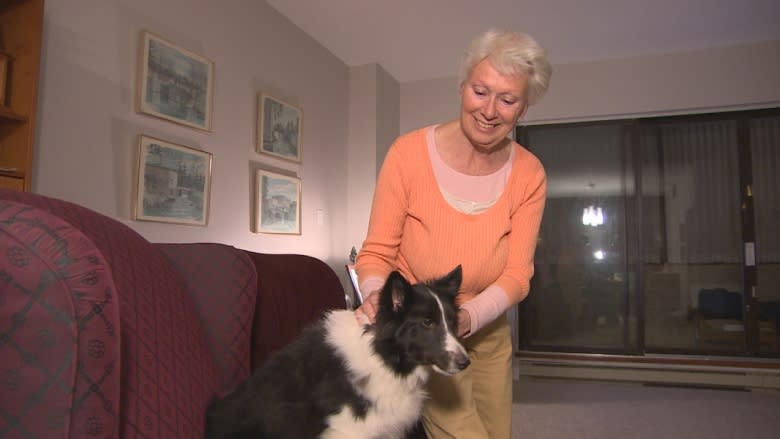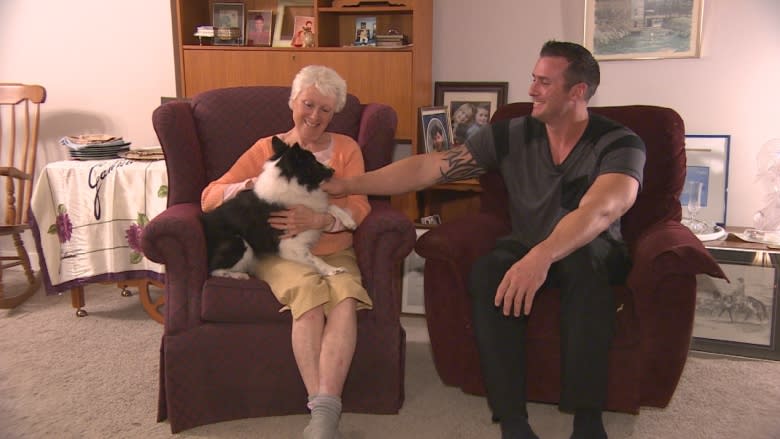Senior with Alzheimer's given ultimatum: Get rid of service dog or move
A 72-year-old woman with Alzheimer's may be forced to give up her dog or lose her home because the condo board has refused to recognize the dog as a service animal.
Her family has filed a complaint with the Manitoba Human Rights Commission, but it won't be resolved before she faces eviction from the no-pets building on Oct. 31.
Donna Davidson was diagnosed with Alzheimer's disease five years ago. Three years ago, she left her home in Charleswood to go for a walk and couldn't find her way back. That's when her son Murray Davidson did some research and decided to get her a service dog
Donna Davidson takes Kaos everywhere she goes and the dog makes sure she can find her way back home.
"I never thought about looking at your dog as being your guardian angel kind of thing, to get me back [home]," said Davidson.
.
Murray got the dog from a breeder in Alberta and trained the now three-year-old Sheltie himself.
"This animal takes my mother to her husband in his care home and takes her back home. And I know and I can feel safe that she's going to get there and she's going to get home again," said Murray.
In February of this year, Murray moved his mother into a condo on Tuxedo Avenue close to his father's personal care home so she could visit him anytime she wanted. The condo doesn't allow pets, but Murray didn't think the dog would be an issue because it is a service animal.
"This is a service animal...for a medical condition. Pet laws, unfortunately for this building, do not apply in this case," he said.
The condo board said the Davidsons have not provided adequate proof that Kaos is in fact a trained service dog.
"The service dog has to have been trained. Training is critically important. We've asked on a number of occasions if the owner could provide us with a description of the training that has taken place, and he hasn't done that," said Bruce MacFarlane, chair of the condo board.
Murray said he's done everything he can to provide them with documentation, including a note from his mother's doctor and a certificate from Service Dogs Canada, an organization that provides identification for service dogs, but not training.
Murray said the condo board issued his mother a letter stating the dog must be removed from her home by October 15, or she must move out by October 31.
"They don't seem to see any other resolution other than the animal gone, or my mother gone," said Murray.
MacFarlane said the board would have no problem allowing a service animal if the family could prove it has the required training.
No regulations for service dogs
Donna said she doesn't want to move, but also won't give up her dog.
"This dog is necessary for my mental and physical health," she said. "Some people might not think it's such a big deal, but for me it is."
Murray filed a complaint with the Manitoba Human Rights Commission (MHRC) last week hoping to resolve the matter.
The MHRC can't comment on any specific case, but said a definition of service animal was added to the Human Rights Code in 2012 and is defined as an animal that is trained to assist a person with a disability, or with their disability-related needs.
There is no regulated criteria, however, regarding training or documentation for service dogs in Manitoba.
"Our focus is always on whether the person with the disability relies on that animal for assistance," said Isha Khan, executive director of the MRHC.
Murray said the lack of clear guidelines regarding the training of service animals has put them in this position.
"It'd be better if there was a law that was specific and guidelines were set out, then problems like this would not happen," he said.
"I'm just trying to do the best I can and [be] the best advocate for my mother."




